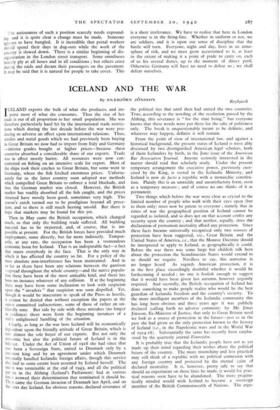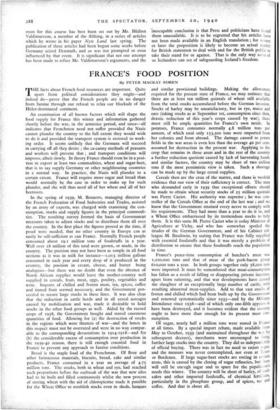ICELAND AND THE WAR
By SNiEBJCIRN JONSSON Reykjavik
ICELAND exports the bulk of what she produces, and im- ports most of what she consumes. Thus the size of her trade is out of all proportion to her small population. She was therefore particularly hard hit by the international trade restric- tions which during the last decade before the war were pro- ducing so adverse an effect upon international relations. Thus, textiles and metal goods which we had previously been buying in Great Britain we now had to import from Italy and Germany —inferior grades bought at higher prices—because these countries absorbed a considerable share of our exports. Trade was in effect mostly barter. All resources were now con- centrated on fishing on an intensive scale for export. Most of the ships took their catches to Great Britain, but some went to Germany, where the fish fetched enormous prices. Unfortu- nately for us the latter country soon adopted war methods which compelled Great Britain to enforce a total blockade, and thus the German market was closed. However, the British market has readily absorbed all the fish caught, and the prices obtained have mostly been good, sometimes very high. The season's catch turned out to be prodigious beyond all prece- dent, and so there is still much herring unsold. But there is hope that markets may be found for this yet.
Then in May came the British occupation, which changed much, so that only the building trade suffered. All building material has to be imported, and, of course, that is im- possible at present. For the British forces have provided much employment, some directly, but far more indirectly; Tempor- arily, at any rate, the occupation has been a tremendous economic boon for Iceland. That is an indisputable fact—a fact that stares everybody in the face. That is the only way in which it has affected the country so far. For a policy of the most absolute non-interference has been maintained. And in so far as there have been any relations between the garrison —spread throughout the whole country—and the native popula- tion these have been of the most amicable kind, and there has been no instance whatever of any collision. If at the beginning there may have been some inclination to look with suspicion upon the " invaders " that suspicion was soon dispelled. Yet, though it would be inaccurate to speak of the Press as hostile, it cannot be denied that without exception the papers at the outset committed indiscretions, some of these of rather an un- friendly tone. But side by side with these mistakes (no longer in evidence) there were from the beginning instances of a really enlightened handling of the situation.
Clearly, as long as the war lasts Iceland will be economically dependent upon the friendly attitude of Great Britain, which is now almost the sole buyer of our exports. But not only the economic but also the political future of Iceland is in the babnce. Under the Act of Union of 1918 she had since that year been a Sovereign State, united to Denmark only by a common king and by an agreement under which Denmark nominally handled Icelandic foreign affairs, though this service also had to some extent been assumed by Iceland herself. The union was terminable at the end of 1943, and all the political par-ies in the Althing (Iceland's Parliament) had at various times avowed their determination that terminated it should be. Then came the German invasion of Denmark last April, and on the text day Iceland, for obvious reasons, declared severance of the political ties that until then had united the two countries. True, according to the wording of the resolution passed by the Althing, this severance is " for the time being," but everyone knows that these words were put there for the sake of politeness only. The break is unquestionably meant to be definite, and whatever may happen, definite it will remain.
From the point of view of international law, and against a historical background, the present status of Iceland is most ably discussed by two distinguished American legal scholars, both of them Icelanders by birth, in the June issue of the American Bar Association Journal. Anyone seriously interested in the matter should read that scholarly study. Under the present temporary arrangement the executive power, previously exer- cised by the King, is vested in the Icelandic Ministry, and Iceland is now de facto a republic with a monarchic constitu- tion. Plainly this is an unwieldy and unsatisfactory form, even as a temporary measure ; and of course no one thinks of it as permanent.
Two things which before the war were clear as crystal to the limited number of people who walk with their eyes open (but to them only) must now be patent to everyone ; namely that in times of war the geographical position of Iceland cannot be regarded as isolated, and so does not on that account confer any security upon the country ; and that neither, equally, does the declaration of permanent neutrality afford any protection. Since these facts became universally recognised only two sources of protection have been suggested, viz., Great Britain and the United States of America, i.e., that the Monroe Doctrine should be interpreted to apply to Iceland, as geographically it could. Before the war there was some large but childish talk here about the protection the Scandinavian States could extend to us should we require. Needless to say, this nonsense is no longer heard As regards American protection, it is in the first place exceedingly doubtful whether it would be forthcoming if needed ; no one is foolish enough to suggest that it would have been given last autumn, however prgently required. And secondly, the British occupation of Iceland has done something to make people realise who would be the best guardian of Icelandic freedom and the country's security. To the more intelligent members of the Icelandic community this has long been obvious and three years ago it was publicly declared (calling forth no adverse comment) by Mr. J6nas Jonsson, Ex-Minister of Justice, that only to Great Britain need we look as a source of protection in the future—just as in the past she had given us the only protection known to the history of Iceland (i.e., in the Napoleonic wars and in the World War of 1914-18). Substantially the same has recently been empha- sised by the quarterly journal Eimreidin.
It is probably true that the Icelandic people have not as yet made up their mind regarding their wishes about the political future of the country. The more moonshiny and less practical may still think of a republic with no political connexion with any foreign country and protected by the eternal calm of declared neutrality. It is, however, pretty safe to say that should an experiment on those lines be made, it would for prac- tical reasons soon have to be abandoned. The more pragma- tically minded would wish Iceland to become a sovereign member of the British Commonwealth of Nations. The argu- ment for this course has best been set out by Mr. Hedinn Valdimarsson, a member of the Althing, in a series of articles which he wrote in his paper Nytt Land last spring. The publication of these articles had been begun some weeks before Germany seized Denmark, and so was not prompted or even influenced by that event. It is significant that not one attempt has been made to refiite Mr. Valdimarsson's arguments, and the Inescapable conclusion is that Press and politicians have found them unassailable. It is to be regretted that his artides have not been made available in an English translation ; for sooner or later the proposition is likely to become an actual matter for British statesmen to deal with and for the British public to take their stand for or against. That is the only way some of us Icelanders can see of safeguarding Iceland's freedom.



























 Previous page
Previous page